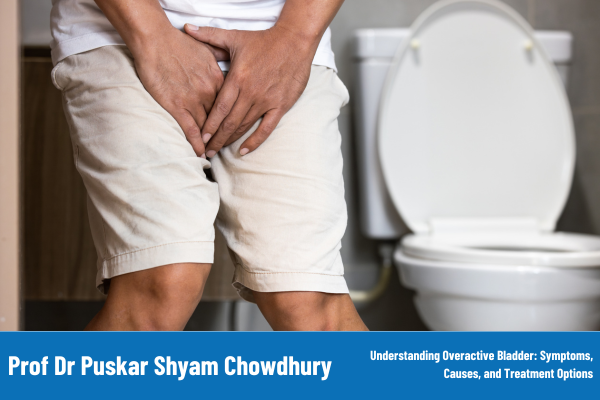Understanding Overactive Bladder: Symptoms, Causes, and Treatment Options
Discover insights on overactive bladder, including symptoms, causes, and treatment options from Dr. (Prof.) Puskar Shyam Chowdhury, a top urologist in Kolkata.
Dr. (Prof.) Puskar Shyam Chowdhury
11/1/20241 min read


Understanding Overactive Bladder: Symptoms, Causes, and Treatment Options
Overactive bladder (OAB) is a common yet often misunderstood condition that affects millions of people, leading to involuntary bladder contractions and frequent urges to urinate. Dr. (Prof.) Puskar Shyam Chowdhury, one of the best urologists and top uro-surgeons in Kolkata, offers expert insights into managing this condition effectively.
What is Overactive Bladder?
Overactive bladder is characterized by a sudden, uncontrollable urge to urinate, often resulting in frequent trips to the bathroom, both day and night. While it is not a disease itself, OAB can significantly impact daily life and overall well-being.
Symptoms of Overactive Bladder
Common symptoms associated with overactive bladder include:
Frequent urination, often more than eight times a day
Sudden urges to urinate that may be difficult to control
Urge incontinence, or unintentional loss of urine
Nocturia, or waking up multiple times during the night to urinate
Causes of Overactive Bladder
The exact cause of OAB can vary from person to person. Some common factors include:
Neurological Disorders: Conditions like multiple sclerosis or Parkinson’s disease can affect nerve signals to the bladder.
Bladder Inflammation: Infections or inflammation can irritate the bladder and trigger OAB symptoms.
Age: As people age, bladder function may decline, leading to OAB.
Treatment Options
Dr. (Prof.) Puskar Shyam Chowdhury emphasizes that effective management of OAB is crucial for improving quality of life. Treatment options may include:
Lifestyle Changes: Dietary modifications and bladder training can help manage symptoms.
Medications: Anticholinergic medications may reduce bladder contractions and urgency.
Neuromodulation Therapy: This innovative treatment involves stimulating the nerves that control bladder function.
Surgery: In severe cases, surgical options may be considered to reduce symptoms.
Conclusion
Overactive bladder is a manageable condition that should not be overlooked. If you or a loved one is experiencing symptoms of OAB, consult Dr. (Prof.) Puskar Shyam Chowdhury, a leading urologist in Kolkata, for an accurate diagnosis and tailored treatment plan.